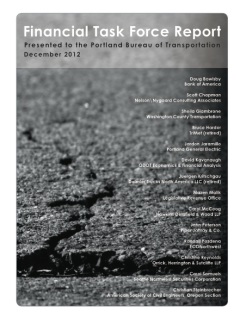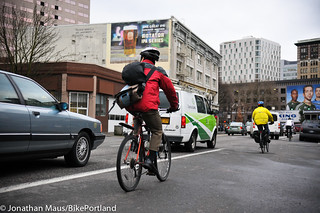
– Download it here (PDF) –
In December of last year, the Portland Bureau of Transportation (PBOT) published a Financial Task Force (FTF) Report. The 22-page document (PDF) gives an overview of the bureau’s budget, outlines its vulnerabilities, and most importantly, gives recommendations for new revenue streams. The report should serve as an important resource in upcoming discussions about our transportation priorities. PBOT turned in their 2013-14 budget to City Hall on Monday and with cuts looming, the City Auditor questioning PBOT’s management — and a new mayor in town who has made it crystal clear he intends to take the bureau in a different direction — now seems like a great time to educate ourselves about PBOT’s finances.
The FTF report is the result of a directive from City Council given during last year’s budgeting process. With no end in sight to painful cuts and no new revenue ideas on the table, City Council tasked PBOT to put together a task force to develop a factual basis for future decisions. The task force that was ultimately formed and that signed off on the report includes 14 people from a variety of backgrounds. There are business leaders, representatives of government agencies (ODOT, TriMet, and so on), civil engineers, legal professionals, and others.
“… we also conclude that the structure of transportation funding is antiquated, unstable and in need of an overhaul.”
— From the report
Outgoing director Tom Miller said recently about the report that, “When council chooses to update our bureau’s revenue model, the analysis and recommendations of our task force will serve as a cornerstone for council’s deliberation and ultimate action.”
The main premise of the report is that current funding models are outdated (or “antiquated” to use their word). That refers a narrative many of you are already familiar with: We have a gas tax that has not kept up with inflation, while the cost of materials used to pave and maintain roads have skyrocketed. Meanwhile, people are driving less and gas mileage is improving (so people are buying fewer gallons of gas). And the gas tax is just one reason why PBOT is in a pinch (we’ll get to more below). The bottom line is, as stated in an introductory letter from the Financial Task Force in the report, “PBOT lacks sufficient funding to meet its mission.”
Another important part of the story that can’t be repeated enough is that Portland’s policy goals — to reduce emissions and get more people to walk, bike, and take transit — are in direct conflict with funding models that rely on people buying gas and paying for auto parking. Here’s how the report puts it:
“The Portland Plan calls for 70 of commuters to either take transit, bike, walk, telecommute or carpool by 2035. Achieving this goal without changes to the existing revenue structure would have devastating consequences for transportation funding.”
One of the things that stood out for me in the report was how unpredictable the PBOT budget is. Only 4% of their budget comes from the City’s General Fund (based on the current budget year). The rest comes from a dizzying array of fees, bonds, grants, taxes, and so on. And those sources are unstable and unpredictable to say the least. Also, unlike utility bureaus like water and electricity, who operate with money from rates that are adjusting annually by City Council, nearly all the money PBOT relies on is largely out of their control — it’s left to the whim of politics and public behavior.
From the report:
“City Council controls four of the six transportation revenue sources. The city’s two most financially significant sources are controlled by the federal and state governments based on complicated distribution formulas.”
Here’s a chart from the report showing the breakdown of PBOT revenue sources (based on the current budget year):

As you can see, about one-third of PBOT’s revenue sources are from what’s generally referred to as “gas tax revenue” (this includes gas tax revenue from the County, the state, the feds, a weight-mile tax (on trucks), and an assortment of motor vehicle related fees). This 30% of revenue is tricky to predict because it’s based on complicated funding formulas and projections that are constantly being revised. Also, gas tax revenue is entirely out of PBOT’s control and the more successful the City is in encouraging people to drive less, the fewer dollars that source provides.
From the report:
“When [parking revenue is] combined with state highway fund revenue, 54 percent of the PBOT revenue is dependent upon the use of motor vehicles.”
Oregon raised its gas tax by $0.06 in 2011. Based in large part by projected revenues from the gas tax (and increased vehicle registration fees), PBOT committed itself to funding two major projects — Portland-Milwaukie light rail and the Sellwood Bridge. The Financial Task Force states that while neither of those projects is a PBOT responsibility, “Half of the city’s new revenue from the $0.06 gas tax increase will be committed to these new projects” (in the current five-year forecast).
Then, addressing a key criticism of the agency made by the recent PBOT financial audit, the report states:
“In honoring each [funding] request [from TriMet and Multnomah County], however, the city dramatically limited its ability to invest in its own street network as maintenance obligations and investment opportunities to advance critical freight and multimodal goals continue to grow.”
After gas tax revenue, the next largest source of funding — 23% — comes from parking meters and SmartPark garages. Since gas tax revenue cannot (by law) be spent on transit, the FTF report points out that parking revenue is prized for its flexibility. It can essentially be spent on anything PBOT and/or City Council deems worthy. However, since parking revenue is so discretionary, and it can be used to fund transit operations and maintenance, the FTF report points out a sobering reality:
“When the streetcar’s central city loop is expected to be completed in 2015, the annual streetcar operations cost is estimated to be $11.4 million. With state highway fund revenues unavailable to use in streetcar operations, the importance of parking revenue grows.”
Another 17% comes from services provided by PBOT to other City agencies (such as the bioswale curb extensions they install for the Bureau of Environmental Services’ “green streets” program). This revenue source is at the whim of the budgets in other agencies and is therefore considered quite unpredictable.
Add to that 4% of the budget from the City’s General Fund and 8% in various fees (like permits to use the right of way and System Development Charges) and you’ve got around 52% of the PBOT budget that is controlled directly by City Council (and the political horse-trading that comes with it). Council sets parking fees, they sign-off on intra-agency agreements (like the one with BES), they decide what PBOT expenses to fund through the General Fund, and they set fee amounts and decide which projects should be funded with them.
The remaining 17% of PBOT’s revenue comes from federal, state, and regional grants.
There is a tendency for the local media (and even the City Auditor) to blame PBOT directly for all sorts of funding-related decistions; but it seems unfair once you realize who holds the purse strings.
As for what to do about the woeful state of PBOT funding, the FTF report makes several recommendations for new revenue options.
The number one option they recommend are the sale of “general obligation bonds.” According to the report, the City’s Office of Management & Finance has already done the math:
“… a $25 average annual property tax increase could be used to support 20-year general obligation bonds that could provide approximately $108 million if applied to all properties citywide.”
The task force also recommends a street maintenance fee, an overhaul of parking fees (to a performance pricing model), a commercial parking tax, and they support statewide options like the vehicle miles traveled tax (being worked on by ODOT) and tolling. All of these are feasible and common sense ideas. It’d be a shame to put them off any longer.
Transportation is highly politicized in this town and I don’t see that changing any time soon. In fact, I have a hunch it will only become moreso in the months to come. The FTF report is a resource I hope contributes a factual and contextual framework to the debate.
— Download the Financial Task Force Report here (PDF).


